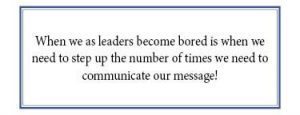“How to Tell Your Employees How to Vote: American Business Advisors and Colorado Amendment 69”
Author’s note: We have intentionally reprinted last week’s Insider in a slightly different form to model the principle of repetition.
In “telling your employees how to vote,” be sure to remind them that it’s important for them to vote their conscience. In order to connect with their conscience as best as possible, brain science tells us they need to do a few key things to diminish the levels of adrenaline, cortisol and a multitude of elevated stress hormones:
- Turn off their screens
- Go for a walk
- Drink lots of water
- Reflect on:
- What their core values are
- What is in the best interest of their loved ones
- What is in the best interest of their community, our nation, and our world
Then cast their vote.
TRUST = Credibility + Reliability
Perceived Self-Interest
The current political climate makes it difficult to have civil conversations about anything remotely political. Nevertheless, it’s important to find an effect way to communicate to our employees and other stakeholders what we believe is important.
But how do we break the “sound barrier”? Say too little about any issue and we appear to be fearful or complicit with whoever is voicing their opinion the loudest. Say too much and we come across as bombastic and bigoted.
This formula says it all:
TRUST = Credibility + Reliability
Perceived Self-Interest
The goal of every business owner/leader is to create great work places—great incarnated -- where great products and great services can be created and delivered to clients. Great work environments are built upon trust. Trust is built up through the multitude of ways we set the tone of communicating with our teams:
- Our attitude
- Our stories
- Our interactions
- What we say
- What we don’t say
- What our digital footprint is
- What our digital footprint is not
In other words, how we choose to “show up” and the small daily deposits we make implicitly and explicitly shape what we communicate. It’s the small deposits we make that build credibility and reliability, a sense that our employees know what to expect.
What can rapidly diminish the value of any trust built is that denominator of “perceived self-interest.” The stronger the sum total of the messages we send to our employees and stake-holders that what we do is about us-- about what’s in our self-interest-- the weaker the trust.
Lest we feel paralyzed, what do we recommend business owners do to build trust and yet be true to themselves?
- Define the issue and communicate both the pros and cons of any issue.
- Provide as many instances as possible of different ways to understand the issue.
In order to communicate effectively, an owner/leader needs to say the same thing in different ways 7+ times. You might consider using
- Formal weekly meetings/PowerPoint presentation
- Flyers, Know Amendment 69 Before You Vote
- Video, ColoradoCare Initiative/Amendment 69
- Non partisan 3rd party published resources like Colorado Health Institute, An Independent Analysis and Ballotpedia, Colorado Creation of ColoradoCare System, Amendment 69 (2016)
- Hallway conversations, phone calls, email and social media interactions that stay “on message”
When we as leaders become bored is when we need to step up the number of times we need to communicate our message!
- Listen to whatever the person’s perspective is. You will have employees who support or oppose an issue because of personal experience or self-benefit or empathy and compassion for those who need their vote/support.
- Acknowledge that all of us have “self-interest.” Rather than pretend we are neutral, it is better to say that we do have a perspective and courageously defend it.
- Politely, civilly present your position.
- Call to action: encourage your people to take action and vote their convictions.
Let’s use the example of a Colorado ballot issue—Amendment 69-- to illustrate how to tell your employees how to vote.
What the issue is:
Amendment 69 is a proposed change to the Colorado state constitution that provides a single-payer healthcare payment system, ColoradoCares, through an additional 10% payroll tax –paid 2/3 by employers, 1/3 by employees. This tax would provide approximately $25 billion per year. This system would be an independent state agency that doubles the size of the state budget and provide access to healthcare for all who have resided in Colorado at least one year.
What our company recommends:
American Business Advisors recommends that all Coloradoans vote “No” on Amendment 69. We agree with Colorado state treasurer Walker Stapleton:
While I realize that there’s a lot of uncertainty regarding healthcare coverage by many Coloradans, this is absolutely not the answer. ... This will result in $25 billion in unfunded liabilities in Colorado, and the people who will bear the brunt of this cost will be our employers, especially our sole proprietors, small-business owners and the generators of our economic growth.
SOURCES:
Ballotpedia
Colorado Health Institute
Fort Collins Chamber, Paper Amendment 69
Toolkit:
Let us know what your experiences are in communicating on ballot issues with your employees.
And urge them to vote!
The following post “How to Tell Your Employees How to Vote: American Business Advisors and Colorado Amendment 69” Find more on: American Business Advisors Management Consulting Firm In Denver


Comments
Post a Comment